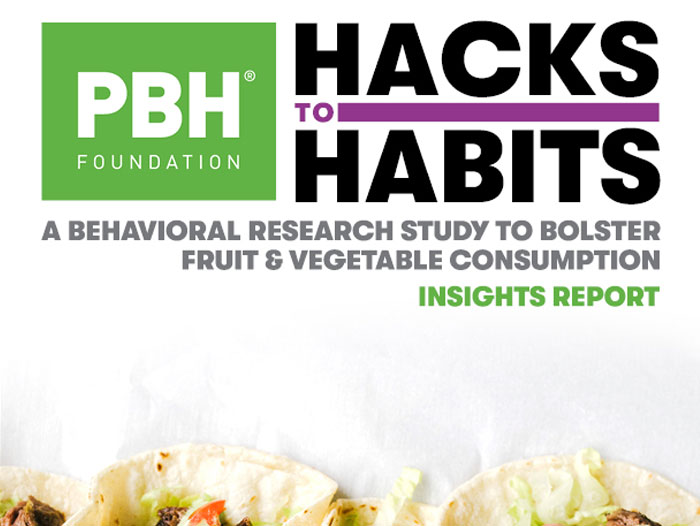Produce For Better Health Foundation Releases New Consumer Research Illuminating Key Behaviors to Close the Fruit & Vegetable Consumption Gap
September 15, 2022 | 6 min to read

The Produce for Better Health Foundation (PBH) today released its latest research report: Hacks To Habits: A Behavioral Research Study To Bolster Fruit & Vegetable Consumption. As part of PBH’s commitment to research across three platforms: food, nutrition and behavioral science; policy analyses; and consumer consumption trends, this new report reinforces the organization’s mission to improve fruit and vegetable consumption in America for better health and happiness.
The new PBH Hacks To Habits research was designed to be laser-focused on the attitudes and behaviors of those consuming varying levels of fruits and vegetables, to better understand which strategies, such as simple hacks, could effectively make it easier for Americans to adopt and sustain fruit and vegetable consumption habits.
The new PBH research report is being released to further celebrate September as National Fruits & Veggies Month and to inform the upcoming White House Conference on Hunger, Nutrition, and Health on Wednesday, September 28th. The White House Conference is designed to be a starting point to address the Administration’s goal of ending hunger and reducing the risk of diet-related disease by 2030. According to the PBH-Nutrition On Demand Fruit & Vegetable Gap Analysis: Bridging The Disparity Between Federal Spending & America’s Consumption Crisis, released earlier this year, inadequate fruit and vegetable consumption cost the US at least $98.2 billion in 2020 and is projected to grow to $137.0 billion by 2030.

“Now more than ever, it is imperative to raise national awareness for fruits and vegetables and acknowledge the important role they play in America’s health and happiness. Identifying successful ways to inspire simple and sustainable habits at all points of consumers’ food journey will be essential to successfully reversing the fruit and vegetable consumption decline,” said Wendy Reinhardt Kapsak, MS, RDN, PBH President & CEO. “At PBH, we are committed to sharing research data that not only help drive demand (i.e., translate to sales), but also provide industry and key opinion leaders as well as food, nutrition and lifestyle communicators with key insights that can inform how we can close the consumption gap.”
Several new insights grew out of the exploration of the inner workings of fruit and vegetable consumption behaviors, including insights into the habits, mindsets and behaviors of those who consume the highest levels of fruits and vegetables and those who consume little to none. Key findings include:
- Habit-creating opportunities for fruits and vegetables are very different;
- Fruit and vegetable habits are context-specific automatic behaviors;
- High-frequency and medium-frequency eaters have more fruit and vegetable habits; and
- Low-frequency fruit and vegetable consumers can build habits from hacks.
“We were thrilled to have the new PBH Hacks To Habits research insights to inform our National Fruits & Veggies Month content strategy and create consumer-facing activations inclusive of creative hacks to prompt lifelong habits,” said Katie Calligaro, PBH Marketing & Communications Director. “If we want consumers to change their behavior, we must consider both barriers and positive cues as well as immediate rewards, such as taste and flavor, when we communicate with them. Only then can break through – make it easy – and inspire greater fruit and vegetable consumption.”
For a more comprehensive look at the research, view the latest PBH Research Insights Report HERE.
Want to learn more? Hear it first-hand during PBH’s Expert Webinar Series, Thursday, October 20th at 2:00 p.m., ET. During this session, you’ll hear from PBH experts, Wendy Reinhardt Kapsak, MS, RDN, President & CEO of PBH; Amy Myrdal Miller, MS, RDN, FAND, PBH Culinary & Foodservice Specialist; and Annette Maggi, MS, RDN, LD, FAND, PBH Retail Specialist, who will unpack the findings from the new study and share implications and practical solutions for retail, foodservice and communication professionals. REGISTER HERE.
For more information about PBH’s research, mission and how to get involved, contact Wendy Reinhardt Kapsak, MS, RDN, President & CEO of PBH at wendy@pbhfoundation.org.
About the Produce for Better Health Foundation
Produce for Better Health Foundation (PBH), a nonprofit 501(c)(3), is the only national organization dedicated to helping consumers live happier, healthy lives by eating more fruits and vegetables, including fresh, frozen, canned, dried and 100% juice, every single day.
Since 1991, PBH has invested in developing trended insights on attitudes toward all forms of fruit and vegetable consumption, in addition to campaigns and partnerships with government, food industry stakeholders, health professionals and other thought leaders to collaborate, facilitate and advocate for increased intake. Campaigns included first, the 5-A-Day program, and then, the Fruits & Veggies—More Matters public health initiative. While five fruits and vegetables each day is great advice, and more will always matter, PBH’s new behavior-based call-to-action is Have A Plant®. Rooted in behavioral science, PBH’s transformative Have A Plant® Movement is an invitation that will inspire people with compelling reasons to believe in the powerful role fruits and vegetables can play to create happy, healthy and active lives.
Be sure to join the Have A Plant® Movement and get new recipes, snack hacks, meal ideas and other tips from chefs, registered dietitians, as well as food and wellness experts by visiting www.fruitsandveggies.org. Follow us on Facebook @fruitsandveggies; on Twitter @fruits_veggies; on Instagram @fruitsandveggies; on Pinterest @fruits_veggies; and on LinkedIn at Produce for Better Health Foundation. And remember to #haveaplant.
PBH is also responsible for the Lead The Change Collaborative Consumption Campaign – a multi-sector, multi-year initiative designed to maximize the power of PBH’s unique thought leadership position, widespread influencer network, credible scientific and market research, and, most importantly, its innovative members and partners, to lead a call-to-action for addressing the global fruit and vegetable consumption crisis. The initiative includes research, thought leadership and communication platforms to ensure the campaign speaks with One Purpose, One Voice and One Call-to-Action. For more information visit: www.fruitsandveggies.org/lead-the-change.
